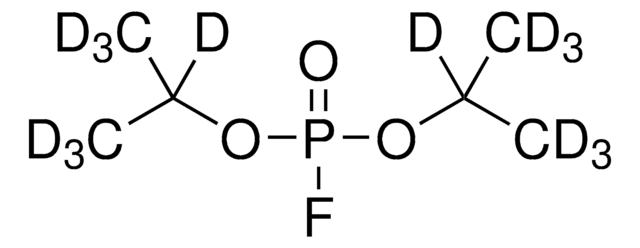14202
Diisopropyl-fluorophosphatase
≥30 U/mg
Se connecterpour consulter vos tarifs contractuels et ceux de votre entreprise/organisme
About This Item
Produits recommandés
Source biologique
fermentation/recombinant
Niveau de qualité
Forme
lyophilized solid
Activité spécifique
≥30 U/mg
Température de stockage
−20°C
Conditionnement
Bottomless glass bottle. Contents are inside inserted fused cone.
Définition de l'unité
One unit corresponds to the amount of enzyme which hydrolyzes 1 μmol diisopropyl fluorophosphate per minute at pH 8.1 and 22 °C
Mention d'avertissement
Danger
Mentions de danger
Conseils de prudence
Classification des risques
Resp. Sens. 1
Code de la classe de stockage
11 - Combustible Solids
Classe de danger pour l'eau (WGK)
WGK 1
Point d'éclair (°F)
Not applicable
Point d'éclair (°C)
Not applicable
Équipement de protection individuelle
Eyeshields, Gloves, type N95 (US)
Certificats d'analyse (COA)
Recherchez un Certificats d'analyse (COA) en saisissant le numéro de lot du produit. Les numéros de lot figurent sur l'étiquette du produit après les mots "Lot" ou "Batch".
Déjà en possession de ce produit ?
Retrouvez la documentation relative aux produits que vous avez récemment achetés dans la Bibliothèque de documents.
Paul D Adams et al.
Acta crystallographica. Section D, Biological crystallography, 65(Pt 6), 567-573 (2009-05-26)
X-ray and neutron crystallographic techniques provide complementary information on the structure and function of biological macromolecules. X-ray and neutron (XN) crystallographic data have been combined in a joint structure-refinement procedure that has been developed using recent advances in modern computational
Marc-Michael Blum et al.
Journal of the American Chemical Society, 128(39), 12750-12757 (2006-09-28)
A wide range of organophosphorus nerve agents, including Soman, Sarin, and Tabun is efficiently hydrolyzed by the phosphotriesterase enzyme diisopropyl fluorophosphatase (DFPase) from Loligo vulgaris. To date, the lack of available inhibitors of DFPase has limited studies on its mechanism.
T Wille et al.
Toxicology in vitro : an international journal published in association with BIBRA, 24(3), 1026-1031 (2009-12-08)
Developing improved medical countermeasures against chemical warfare agents (nerve agents) is urgently needed but time-consuming and costly. Here we introduce a robot-assisted liquid handling system with warming, cooling and incubating facilities to screen the detoxifying properties of biological and chemical
Marc-Michael Blum et al.
Acta crystallographica. Section F, Structural biology and crystallization communications, 63(Pt 1), 42-45 (2006-12-22)
The enzyme diisopropyl fluorophosphatase (DFPase) from Loligo vulgaris is capable of decontaminating a wide variety of toxic organophosphorus nerve agents. DFPase is structurally related to a number of enzymes, such as the medically important paraoxonase (PON). In order to investigate
Dragomir I Draganov
Chemico-biological interactions, 187(1-3), 370-372 (2010-02-04)
Serum paraoxonase (PON1) is well recognized for its ability to hydrolyze arylesters, toxic oxon metabolites of organophosphate insecticides and nerve agents. PON1 is a member of gene family including also PON2 and PON3; however, the later two enzymes have very
Notre équipe de scientifiques dispose d'une expérience dans tous les secteurs de la recherche, notamment en sciences de la vie, science des matériaux, synthèse chimique, chromatographie, analyse et dans de nombreux autres domaines..
Contacter notre Service technique









